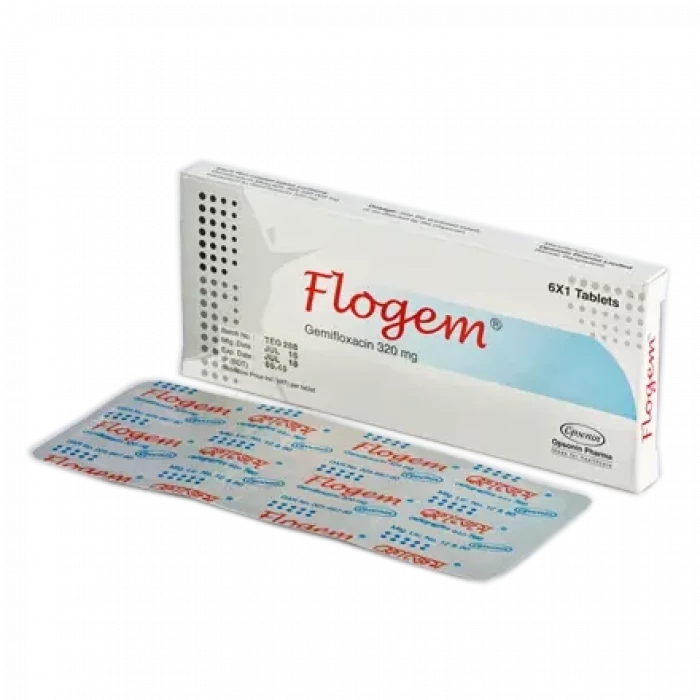Due to National Election, orders may be processed slight delay, nationwide.
Leading Online Pharmacy of Bangladesh

✔ 100% Authentic Product
👁️ Currently Viewing 1340
Flogem 320mg Tablet 1 Strip
Gemifloxacin, the active ingredient in Flogem, belongs to the fluoroquinolone class of antibiotics. It works by inhibiting bacterial DNA synthesis through the inhibition of type II topoisomerases, such as DNA gyrase and topoisomerase IV, which are essential for bacterial growth.
Gemifloxacin is rapidly absorbed after oral intake and is well-distributed in the body, especially in lung tissues (epithelial lining fluid, alveolar macrophages, bronchial tissue) and nasal secretions.
- Excretion: Approximately 36% is excreted through urine and 61% through feces as unchanged drugs or metabolites.
- Gender does not significantly affect drug levels; therefore, no dose adjustment is needed based on gender.
Discount
Price: ৳ 372
MRP:
৳
391.5
5%
Off
✅ Description:
Flogem is prescribed as an adjunct to diet and exercise to improve blood sugar control in adults with type 2 diabetes mellitus. It is used to treat bacterial infections in adults caused by susceptible bacteria, including:
- Acute bacterial exacerbation of chronic bronchitis – caused by Streptococcus pneumoniae, Haemophilus influenzae, Haemophilus parainfluenzae, or Moraxella catarrhalis.
- Community-acquired pneumonia (mild to moderate severity) – caused by Streptococcus pneumoniae (including multi-drug resistant strains), Haemophilus influenzae, Moraxella catarrhalis, Mycoplasma pneumoniae, and Chlamydia pneumoniae.
✔️ Side Effects:
- Common: Abdominal pain, diarrhea, headache, nausea, rash, and vomiting.
- Less common: Fungal overgrowth, dizziness, insomnia, urticaria, pruritus, and maculopapular rash.
✔️ Dosage & Administration:
Acute bacterial exacerbation of chronic bronchitis:
- Standard dose: 320 mg once daily for 5 days.
Community-acquired pneumonia:
- Mild to moderate infection: 320 mg once daily for 5 days.
- Multi-drug resistant strains: 320 mg once daily for 7 days.
Renal Impairment:
- Assess renal function before starting Flogem.
- Do not use if eGFR is below 45 mL/min/1.73 m².
- Discontinue if eGFR falls below this threshold during treatment.
✔️ Drug Interactions:
Aluminum-containing antacids and sucralfate: Reduce Flogem absorption.
- Take Flogem 2 hours before or 3 hours after these agents.
- Omeprazole, theophylline, digoxin, warfarin, oral contraceptives: No significant interaction.
- Insulin or Insulin secretagogues: Increases the risk of hypoglycemia.
- Rifampin (P-glycoprotein or CYP3A4 inducers): Reduces linagliptin levels, possibly decreasing efficacy.
- Urine glucose tests: Flogem increases glucose excretion, leading to positive urine glucose results.
- 1,5-anhydroglucitol (1,5-AG) assay: Unreliable for assessing glycemic control when using SGLT2 inhibitors like Flogem.
Renal impairment:
- Mild to moderate: No dose adjustment.
- Severe impairment (eGFR < 30 mL/min): 160 mg once daily.
- Dialysis patients: 160 mg once daily.
Hepatic impairment: No dose adjustment is needed.
Elderly: No dose adjustment required.
✔️ Contraindications:
- Known hypersensitivity to Gemifloxacin or other quinolones.
- History of tendon damage due to fluoroquinolones.
- Hypersensitivity to Empagliflozin.
- Severe renal impairment, end-stage renal disease, or dialysis.
- Pregnancy and lactation.
✔️ Overdose Effects:
- No specific antidote.
- Supportive care: Remove unabsorbed drug (e.g., induce vomiting) and maintain hydration.
- Hemodialysis does not effectively remove Gemifloxacin.
✔️ Precautions & Warnings:
- Pancreatitis: Can occur, including fatal cases.
- Ketoacidosis: Rare but life-threatening; requires immediate hospitalization.
- Volume depletion: May cause hypotension or acute creatinine changes.
- Urinary infections: Risk of urosepsis and pyelonephritis requiring hospitalization.
- Hypoglycemia: Increased risk when used with insulin or secretagogues.
- Necrotizing fasciitis (Fournier’s Gangrene): Rare but severe, requiring urgent surgery.
- Genital infections: Fungal infections are possible.
- Tendinitis and tendon rupture: Higher risk in elderly or patients on corticosteroids.
- QTc interval prolongation: Caution in patients with a predisposition or on QT-prolonging medications.
- Epilepsy: Use with caution.
- Heart failure: Associated with DPP-4 inhibitors in some studies.
✔️ Storage Conditions:
- Store below 30°C.
- Keep in a dry, light-free place.
- Keep out of reach of children.
⚠️Disclaimer:
At ePharma, we’re committed to providing accurate and accessible health information. However, all content is intended for informational purposes only and should not replace medical advice from a qualified physician. Please consult your healthcare provider for personalized guidance. We aim to support, not substitute, the doctor-patient relationship.






